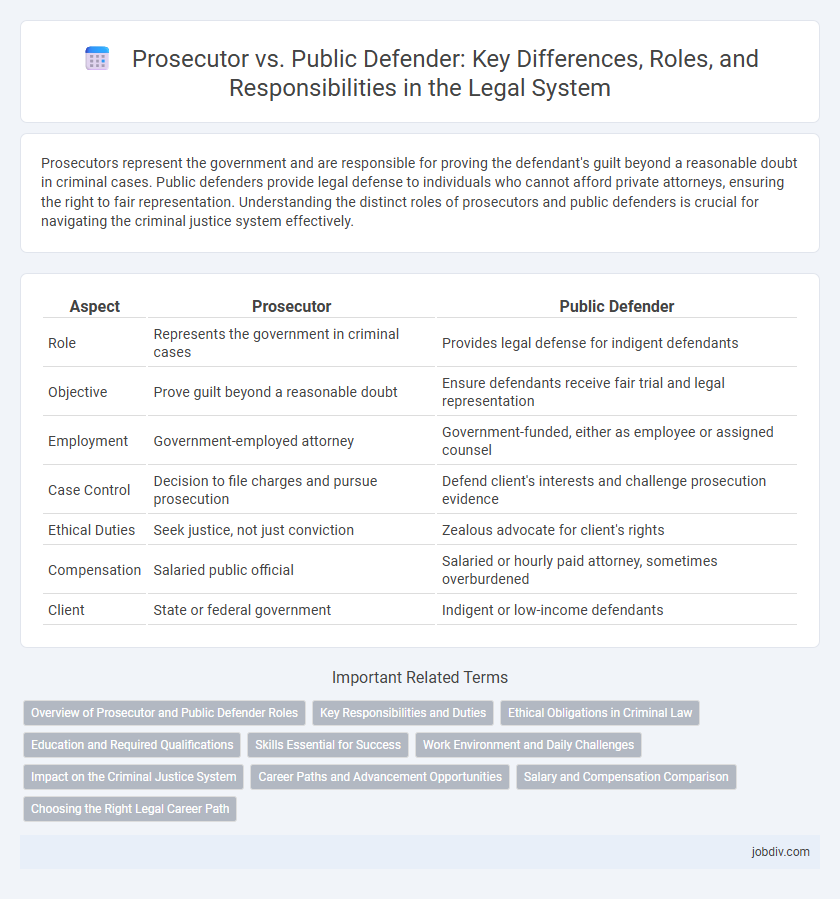Prosecutors represent the government and are responsible for proving the defendant's guilt beyond a reasonable doubt in criminal cases. Public defenders provide legal defense to individuals who cannot afford private attorneys, ensuring the right to fair representation. Understanding the distinct roles of prosecutors and public defenders is crucial for navigating the criminal justice system effectively.
Table of Comparison
| Aspect | Prosecutor | Public Defender |
|---|---|---|
| Role | Represents the government in criminal cases | Provides legal defense for indigent defendants |
| Objective | Prove guilt beyond a reasonable doubt | Ensure defendants receive fair trial and legal representation |
| Employment | Government-employed attorney | Government-funded, either as employee or assigned counsel |
| Case Control | Decision to file charges and pursue prosecution | Defend client's interests and challenge prosecution evidence |
| Ethical Duties | Seek justice, not just conviction | Zealous advocate for client's rights |
| Compensation | Salaried public official | Salaried or hourly paid attorney, sometimes overburdened |
| Client | State or federal government | Indigent or low-income defendants |
Overview of Prosecutor and Public Defender Roles
Prosecutors represent the government in criminal cases, responsible for presenting evidence to prove the defendant's guilt beyond a reasonable doubt. Public defenders provide legal representation to indigent defendants who cannot afford private counsel, ensuring the right to a fair trial. Both roles are essential in maintaining balance within the criminal justice system by advocating for justice and protecting defendants' constitutional rights.
Key Responsibilities and Duties
Prosecutors represent the state and are responsible for presenting evidence against defendants in criminal cases, ensuring that justice is served by proving guilt beyond a reasonable doubt. Public defenders provide legal defense to individuals who cannot afford private attorneys, safeguarding the constitutional right to fair representation and advocating for the accused's interests. Both roles require in-depth knowledge of criminal law, strong courtroom advocacy, and a commitment to upholding the legal process.
Ethical Obligations in Criminal Law
Prosecutors have an ethical obligation to seek justice by presenting evidence truthfully and refraining from pursuing charges without probable cause, while public defenders must vigorously advocate for their clients' rights and ensure competent legal representation. Both roles require adherence to confidentiality, avoidance of conflicts of interest, and maintaining impartiality to uphold the integrity of the criminal justice system. Ethical codes such as the ABA Model Rules of Professional Conduct provide guidelines governing the responsibilities unique to each, emphasizing justice and fairness in criminal proceedings.
Education and Required Qualifications
Prosecutors typically possess a Juris Doctor (JD) degree from an accredited law school and must pass the state bar exam, often benefiting from experience in criminal law or prior prosecutorial internships. Public defenders also require a JD and state licensure but frequently gain specialized training in criminal defense and advocacy for indigent clients during law school clinics or public interest fellowships. Both roles demand strong legal research, courtroom skills, and a deep understanding of criminal justice statutes and procedures.
Skills Essential for Success
Prosecutors require strong analytical skills and the ability to build compelling cases through meticulous evidence assessment and persuasive courtroom advocacy. Public defenders excel in negotiation and client communication, ensuring defendants' rights are protected while crafting effective defense strategies under resource constraints. Both roles demand exceptional legal knowledge, ethical judgment, and resilience to navigate high-pressure environments successfully.
Work Environment and Daily Challenges
Prosecutors operate in high-pressure environments where they must build cases, manage heavy caseloads, and coordinate with law enforcement to ensure justice is served. Public defenders face similar stress but often encounter resource limitations and overwhelming client demands, advocating for individuals who cannot afford private counsel. Both roles require resilience, strong legal knowledge, and the ability to navigate complex courtroom dynamics daily.
Impact on the Criminal Justice System
Prosecutors play a crucial role in upholding public safety by charging and seeking convictions of individuals accused of crimes, which directly influences rates of crime deterrence and public trust in law enforcement. Public defenders ensure the constitutional right to fair representation, balancing prosecutorial power and preventing wrongful convictions through vigorous defense. The dynamic between prosecutorial authority and public defense advocacy shapes case outcomes, court efficiency, and the overall integrity of the criminal justice system.
Career Paths and Advancement Opportunities
Prosecutors typically advance through government legal offices, often starting as assistant district attorneys and progressing to senior prosecutor or district attorney roles, with opportunities to transition into judgeships or higher public office. Public defenders often begin in public defender offices, gaining crucial courtroom experience before moving into senior defense counsel positions or leadership roles within public defense organizations; some may transition into private practice or criminal justice reform advocacy. Both career paths offer unique advancement opportunities influenced by public sector experience, courtroom exposure, and specialization in criminal law.
Salary and Compensation Comparison
Prosecutors typically receive higher base salaries compared to public defenders, with median annual earnings around $85,000 versus $60,000 respectively, reflecting the differing budget allocations and funding sources between prosecutorial offices and public defense agencies. Compensation packages for prosecutors often include performance bonuses and additional benefits such as hazard pay, which public defenders usually lack due to constrained government funding. Despite lower salaries, public defenders may receive loan repayment assistance programs aimed at addressing high law school debt, though overall financial incentives remain less competitive relative to prosecutorial roles.
Choosing the Right Legal Career Path
Choosing between a prosecutor and a public defender career path hinges on personal values, courtroom experience, and professional goals. Prosecutors prioritize representing the state and seeking justice by proving guilt beyond a reasonable doubt, while public defenders focus on ensuring fair legal representation for defendants, often in cases involving indigent clients. Understanding the ethical responsibilities, case types, and typical workloads helps legal professionals align their career with their passion for advocacy and justice.
Prosecutor vs Public Defender Infographic

 jobdiv.com
jobdiv.com